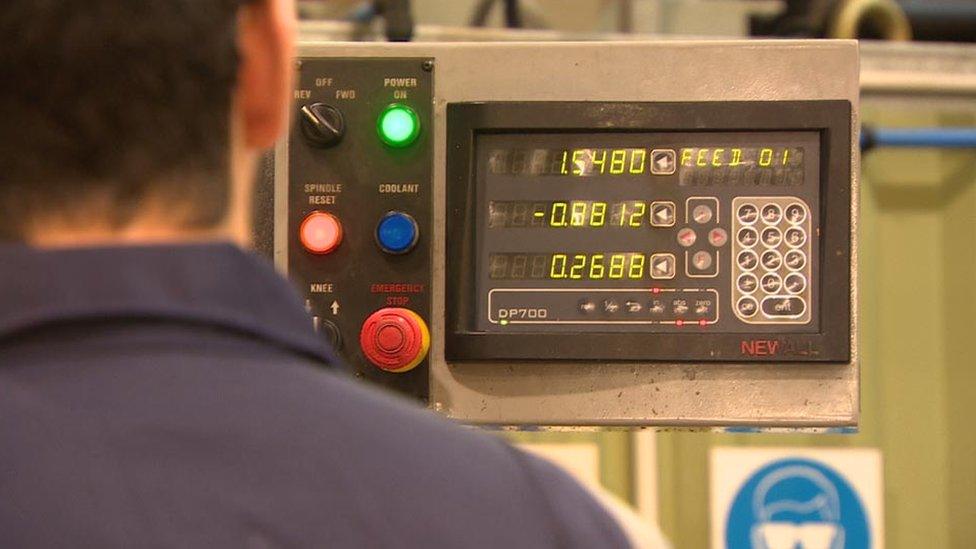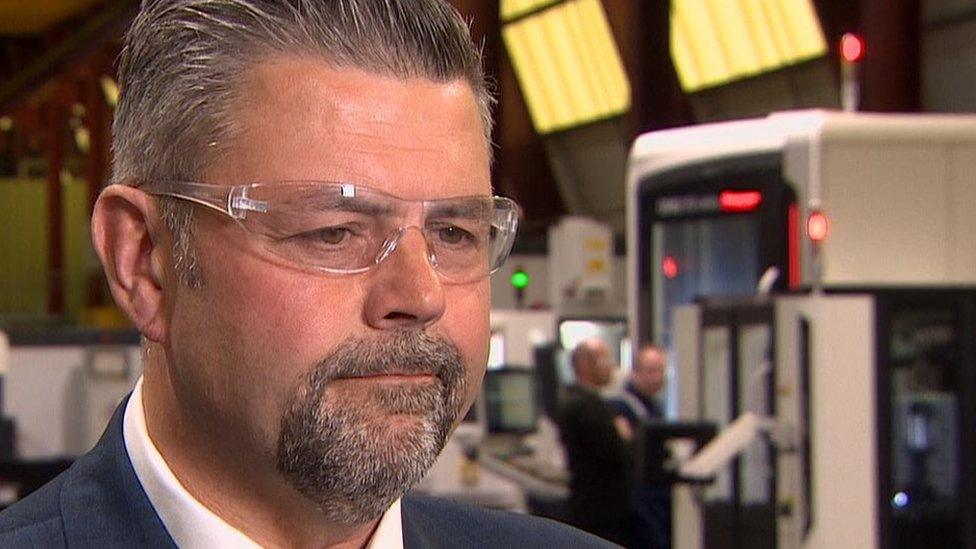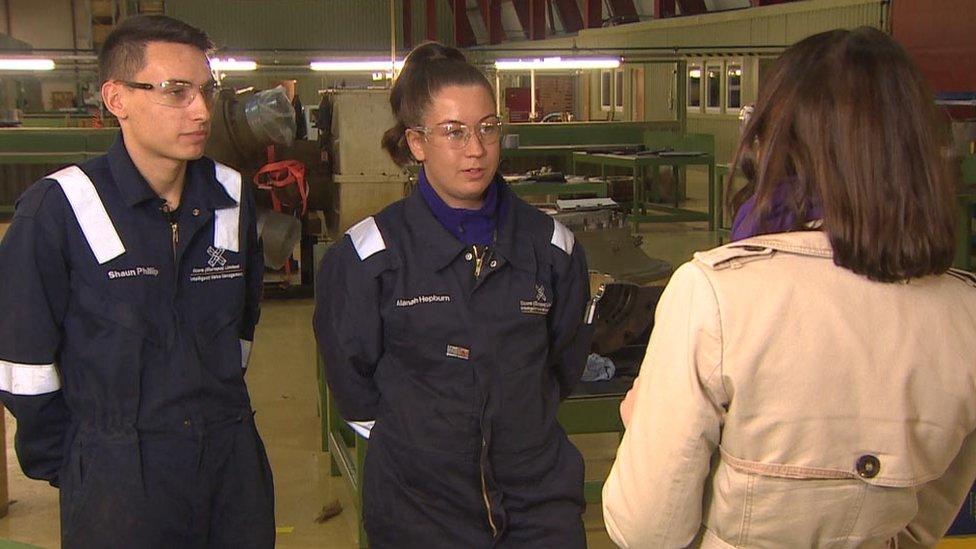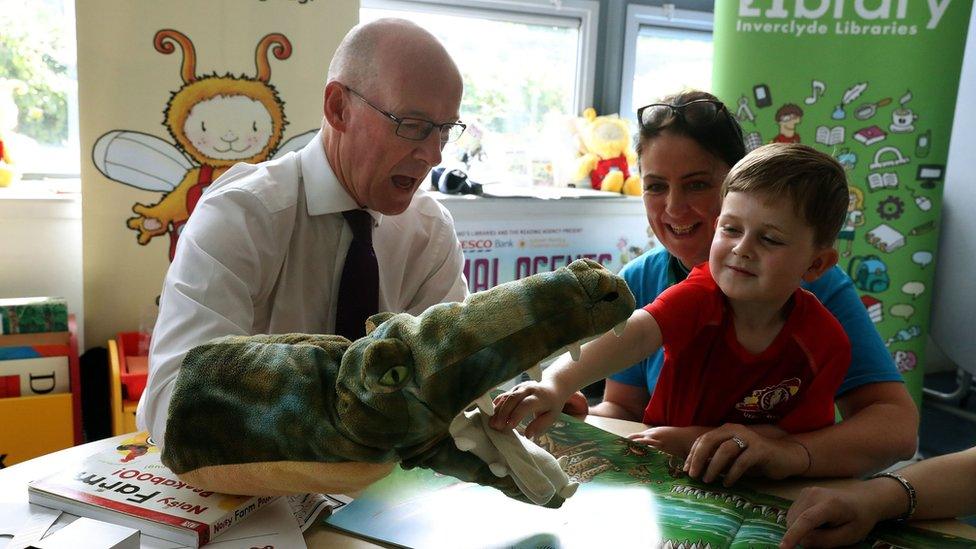Apprentices 'being failed by school curriculum' says Peterhead employer
- Published

Score is a major employer of young apprentices
Scotland's largest private employer of apprentices has claimed the school curriculum is failing young people.
Conrad Ritchie, the managing director of Peterhead-based engineering firm Score International, said he had seen a decline in the basic numeracy and literacy skills of school leavers.
The company now funds private maths classes for many new recruits, ahead of entrance exams for apprenticeships.
The Scottish government said it was committed to teaching the right skills.
Score - one of Peterhead's biggest employers - has been operating in the north east of Scotland since 1982.
Prospective apprentices must sit a basic aptitude test before joining the six-year programme.
Half are said to have been failing.

Managing director Conrad Ritchie described the situation as "very concerning"
Mr Ritchie told BBC Scotland: ''We've been taking on apprentices now for over 30 years.
"We currently have 300 in our programme and over the last 10 years, since the introduction of the Curriculum for Excellence (CfE), we've seen a steady decline in their basic grasp of numeracy.
"It's very concerning for a company like ours.''
In the last four years, the firm has taken on about 200 apprentices.
'Like a foreign language'
It has paid for 120 young people to receive extra classes to help their basic skills.
The classes focus on basic numeracy, such as fractions, areas and perimeters.
About half of those young people are now employed by the company.
Ian Barbour, the senior technical trainer at Score, said of the recruits: ''Some of them are not able to do fractions, some of the time. Not all the time.
"Some of them find it quite difficult. They find maths just like a foreign language.''

Shaun Philip and Alanah Hepburn spoke to BBC Scotland's Rachel Bell
Two apprentices - Alanah Hepburn and Shaun Philip - took part in the maths classes before sitting their entrance exams.
Shaun said: "To start off with, it was definitely a challenge because I felt I wasn't up to the level of what I should know by this point."
Alanah said: "You're touching up on fractions and stuff that you haven't touched on for a long time.
"Like from primary school because in secondary school you kind of move on from that because you're expected to know that kind of stuff."
'Skills they will need'
Managing director Mr Ritchie - a supporter of the Scotland in Union campaign - insisted his concerns were not "politically motivated".
He said: ''As a company we have concerns, and we want acceptance that there is a problem.
"We're urging the Scottish government to engage with us, to get round the table to try and fix the problem."

Aberdeenshire Council praised Peterhead Academy's improvement
A Scottish government spokesperson said: "Through our STEM (science, technology, engineering and maths) education and training strategy we are committed to ensuring children and young people are equipped with the STEM skills they will need in later life.
"Employers also have an important role to play here, working with schools to enrich STEM learning and inspire young people to follow careers in these areas.
"The development of school-employer partnerships is a key part of our Developing the Young Workforce strategy and our wider STEM strategy."
Strongly refute claims
Vincent Docherty, the head of education at Aberdeenshire Council - himself a former maths teacher - said: "While we wouldn't normally be drawn into a debate concerning the national curriculum, it's important to highlight Peterhead Academy's attainment record has been improving steadily for the last five years across a number of subjects, including maths.
"The percentage of S4 pupils attaining literacy and numeracy at National 5 was 8% above the national average in 2018.
"I would strongly refute any suggestion that the majority of young people are leaving less equipped and without the basics.
"Fractions, for example, are a part of the curriculum from age three onwards."
- Published3 September 2017

- Published7 August 2017

- Published26 July 2017
